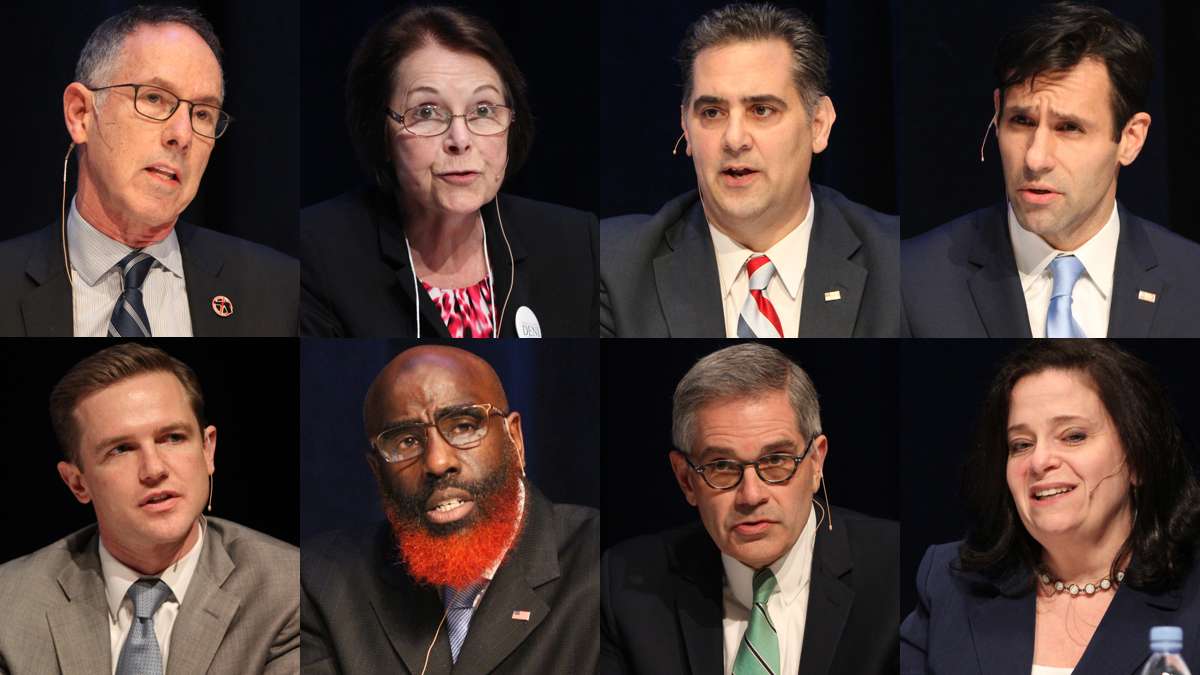Philly’s next district attorney should fight poverty, not just crime

Eight candidates for Philadelphia district attorney are shown at a candidate debate on March 23 (clockwise from top left) Michael Untermeyer, Teresa Carr Deni, Rich Negrin, Joe Khan, Beth Grossman, Larry Krasner, Tariq El-Shabazz, and Jack O'Neill, met for a debate at Springside Chestnut Hill Academy. (Emma Lee/WHYY)
With the Philadelphia district attorney’s race heating up, many candidates are promising to make significant reforms to the office. The most transformative change that the new DA will be able to make is to re-envision the DA’s office as a poverty fighter, not just a crime fighter. In America’s poorest big city, this shift in mindset is critical.
To be an effective poverty fighter, the DA’s office needs to ensure that it is serving all communities within the city. This means that all Philadelphians, including immigrants and people of color, should feel that they can interact with the police and DA. It also means that the DA should implement policies that actually make our city safer, including criminal records reforms that encourage people to remain crime-free and helping immigrants to report crimes without fear of deportation. By making a concerted effort to serve low-income Philadelphians, the new DA can truly transform our city for the better.
Each year, Community Legal Services helps more than 1,000 people with old, minor criminal records to get a fresh start. Through our extensive work with people who have criminal records, we have seen that any contact with the criminal system can have life-long and life-altering impacts. Even seemingly minor contacts with the criminal system can forever affect a person’s ability to get a job, stay in safe housing, go to school to improve employment prospects, and even remain in the country.
The DA’s office has tremendous discretionary power in who it chooses to charge; the new DA should use that discretion to avoid over-criminalizing people, particularly poor people of color.
Addressing root problems and clearing old records
For those who the DA does charge, the office should expand the use of diversion programs. These programs aim to solve root problems by providing support for people struggling with drug addiction, mental health challenges, or the conditions of deep poverty. It is especially important to expand the use of diversion programs that allow for record clearing upon program completion so that participants do not carry the stigma of a criminal record for decades to come.
For people who have had contact with the system, the DA should broadly support criminal record clearing. Allowing a person to clear their record is one of the most effective poverty-fighting tools that the DA has. Without a criminal record, it is far easier for people to obtain the necessities of life, like jobs and safe housing. Our current laws allow clearing of any charge that did not lead to conviction and sealing of some minor misdemeanor convictions. The DA can promote expungement by agreeing to not challenge valid expungement petitions, ensuring that individuals who often have jobs hanging in the balance can get speedy relief.
The DA should also support expansion of the current record clearing laws. The Clean Slate bills currently under consideration in Harrisburg would automatically seal many old and minor misdemeanor convictions. They would also automatically seal any charges that did not result in conviction. These bills would proactively help thousands of people in Philadelphia and throughout the commonwealth by clearing their records without requiring a costly and time-consuming court petition.
The DA can also support youth by ensuring they aren’t punished for decades for making minor mistakes. Despite common misconception, juvenile records are widely accessible and can impact access to employment, education, and more. People with juvenile records must wait five years after they have completed supervision to get expungements, unless the DA agrees to expungements earlier. The DA’s office should support the ability of young people to move more quickly beyond their juvenile court involvement by agreeing to expungements before the five year period has elapsed.
Fair treatment of immigrant communities
Finally, all Philadelphians need to feel safe within our community. Immigrants should feel that they can interact with the police and DA’s office without fear of deportation. They should be able to report crimes, act as witnesses, and even have their day in court without fear that doing so will land them in an ICE facility. The DA should promote a culture of community by rejecting ICE access to the PARS database. The office should also have a policy to never share information regarding immigration status with ICE and should always consider immigration consequences to immigrants during plea negotiations. As well, the DA should implement a comprehensive language access plan so that all those interacting with the office, including victims and witnesses, can do so in the language that they most comfortable with.
As the District Attorney candidates promise to make reforms, they should commit to policies that fight against deep poverty and inequity that is so often only perpetuated by contact with the criminal system. Only then will we be truly safe.
—
Jamie Gullen and Michael Hollander are both attorneys in the employment unit at Community Legal Services of Philadelphia.
WHYY is your source for fact-based, in-depth journalism and information. As a nonprofit organization, we rely on financial support from readers like you. Please give today.




